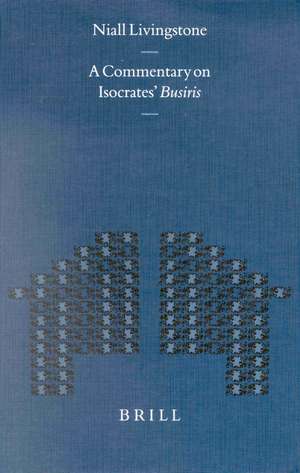A Commentary on Isocrates' Busiris: Mnemosyne, Supplements, cartea 223
Autor Livingstoneen Limba Engleză Hardback – 27 iun 2001
The commentary reveals Isocrates’ strategies in advertising his own political rhetoric as a middle way between amoral ‘sophistic’ education and the abstruse studies of Plato’s Academy. Introductory chapters situate Busiris within the lively intellectual marketplace of 4th-century Athens, showing how the work parodies Plato’s Republic, and how its revisionist treatment of the monster-king Busiris reflects Athenian fascination with the ‘alien wisdom’ of Egypt.
As a whole, the book casts new light both on Isocrates himself, revealed as an agile and witty polemicist, and on the struggle between rhetoric and philosophy from which Hellenism and modern humanities were born.
Din seria Mnemosyne, Supplements
-
 Preț: 370.60 lei
Preț: 370.60 lei - 18%
 Preț: 1470.11 lei
Preț: 1470.11 lei - 18%
 Preț: 1598.51 lei
Preț: 1598.51 lei - 18%
 Preț: 735.03 lei
Preț: 735.03 lei - 18%
 Preț: 701.25 lei
Preț: 701.25 lei -
 Preț: 268.14 lei
Preț: 268.14 lei -
 Preț: 90.66 lei
Preț: 90.66 lei - 18%
 Preț: 584.02 lei
Preț: 584.02 lei -
 Preț: 169.79 lei
Preț: 169.79 lei -
 Preț: 216.33 lei
Preț: 216.33 lei - 18%
 Preț: 585.26 lei
Preț: 585.26 lei - 18%
 Preț: 581.91 lei
Preț: 581.91 lei - 18%
 Preț: 729.55 lei
Preț: 729.55 lei - 18%
 Preț: 657.49 lei
Preț: 657.49 lei - 15%
 Preț: 412.41 lei
Preț: 412.41 lei - 18%
 Preț: 708.10 lei
Preț: 708.10 lei - 18%
 Preț: 731.10 lei
Preț: 731.10 lei -
 Preț: 270.76 lei
Preț: 270.76 lei - 18%
 Preț: 730.73 lei
Preț: 730.73 lei - 18%
 Preț: 733.06 lei
Preț: 733.06 lei - 18%
 Preț: 586.34 lei
Preț: 586.34 lei - 18%
 Preț: 731.88 lei
Preț: 731.88 lei - 18%
 Preț: 586.18 lei
Preț: 586.18 lei - 18%
 Preț: 1544.99 lei
Preț: 1544.99 lei - 18%
 Preț: 731.65 lei
Preț: 731.65 lei - 18%
 Preț: 732.03 lei
Preț: 732.03 lei - 18%
 Preț: 972.54 lei
Preț: 972.54 lei - 18%
 Preț: 585.95 lei
Preț: 585.95 lei -
 Preț: 380.61 lei
Preț: 380.61 lei - 18%
 Preț: 718.31 lei
Preț: 718.31 lei - 18%
 Preț: 732.21 lei
Preț: 732.21 lei - 18%
 Preț: 586.26 lei
Preț: 586.26 lei - 18%
 Preț: 731.59 lei
Preț: 731.59 lei - 18%
 Preț: 1257.68 lei
Preț: 1257.68 lei - 18%
 Preț: 970.27 lei
Preț: 970.27 lei - 18%
 Preț: 557.30 lei
Preț: 557.30 lei - 18%
 Preț: 847.32 lei
Preț: 847.32 lei - 18%
 Preț: 732.44 lei
Preț: 732.44 lei - 18%
 Preț: 731.80 lei
Preț: 731.80 lei -
 Preț: 355.16 lei
Preț: 355.16 lei - 18%
 Preț: 588.14 lei
Preț: 588.14 lei - 18%
 Preț: 1211.56 lei
Preț: 1211.56 lei - 18%
 Preț: 586.11 lei
Preț: 586.11 lei - 18%
 Preț: 732.83 lei
Preț: 732.83 lei - 18%
 Preț: 732.35 lei
Preț: 732.35 lei - 18%
 Preț: 1484.13 lei
Preț: 1484.13 lei - 18%
 Preț: 731.59 lei
Preț: 731.59 lei - 18%
 Preț: 730.63 lei
Preț: 730.63 lei - 18%
 Preț: 732.03 lei
Preț: 732.03 lei - 18%
 Preț: 970.21 lei
Preț: 970.21 lei
Preț: 730.56 lei
Preț vechi: 890.93 lei
-18% Nou
Puncte Express: 1096
Preț estimativ în valută:
139.80€ • 149.49$ • 116.56£
139.80€ • 149.49$ • 116.56£
Carte indisponibilă temporar
Doresc să fiu notificat când acest titlu va fi disponibil:
Se trimite...
Preluare comenzi: 021 569.72.76
Specificații
ISBN-13: 9789004121430
ISBN-10: 9004121439
Pagini: 225
Dimensiuni: 155 x 235 x 21 mm
Greutate: 0.55 kg
Editura: Brill
Colecția Brill
Seria Mnemosyne, Supplements
ISBN-10: 9004121439
Pagini: 225
Dimensiuni: 155 x 235 x 21 mm
Greutate: 0.55 kg
Editura: Brill
Colecția Brill
Seria Mnemosyne, Supplements
Public țintă
All those interested in Greek education, the rhetorical tradition, and the intellectual culture of the 4th century BC, as well as Isocratean specialists, Platonists, and students of Greek political thought.Recenzii
'L. had done an excellent job in what will be the definitive commentary on this work...'
David C. Mirhady, BMCR, 2004.
David C. Mirhady, BMCR, 2004.
Notă biografică
Niall Livingstone, D.Phil. (1995) in Classics, Oxford University, is Lecturer in Classics at the University of Birmingham. He is co-editor with Yun Lee Too of Pedagogy and Power: Rhetorics of Classical Learning (CUP, 1998).
